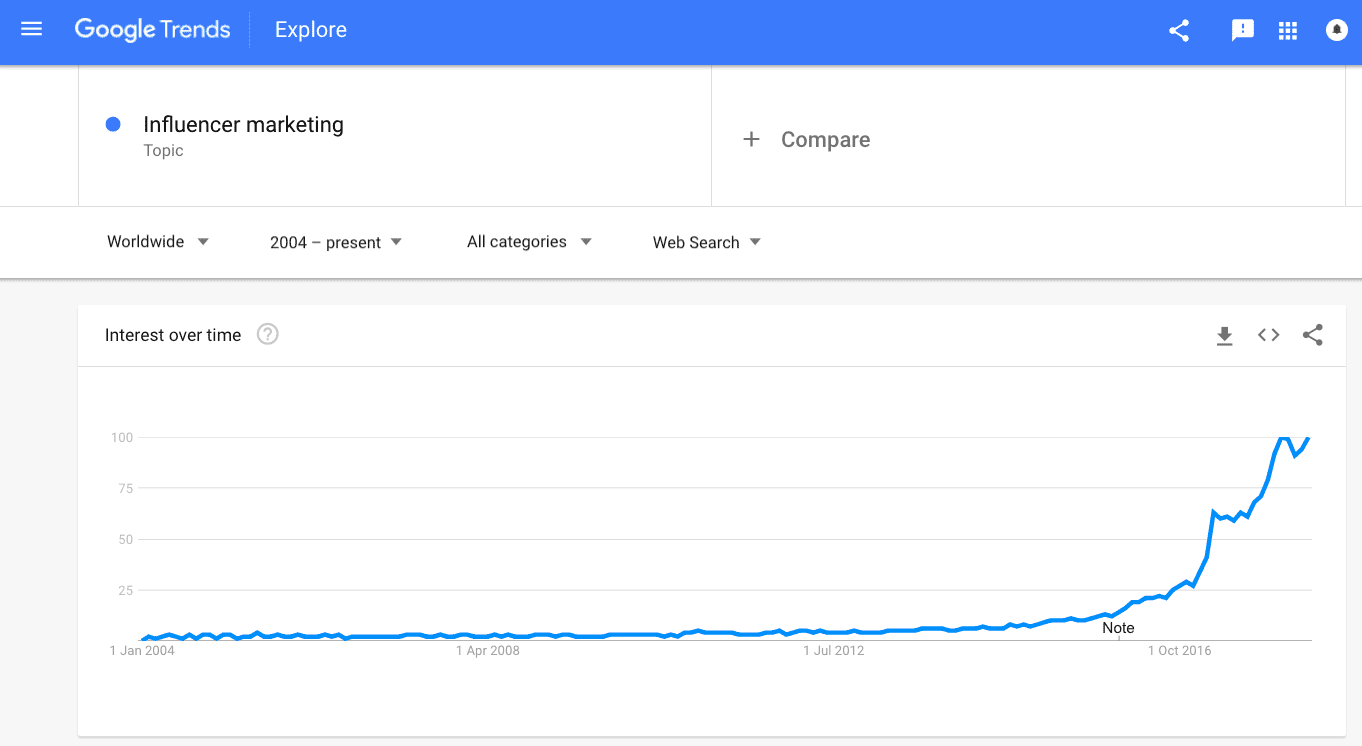Advantages and drawbacks of different influencer marketing solutions.
Did you know that searches for the term “influencer marketing” increased almost by 200% between 2016 and 2017? And, by just the fifth month of 2018, the average monthly searches have already increased by another 60% compared to 2017.

This clearly indicates how influencer marketing has been growing over the past couple of years. And it definitely doesn’t show any signs of stopping. By 2020, the global spend on influencer marketing is expected to be anywhere between $5 and $10 billion.
The growing popularity and success of influencer marketing have encouraged many marketers to focus more on it. 85% of marketers are using it, and 90% of them have found it to be the most effective form of marketing. So it shouldn’t come as a surprise that over 60% of marketers wish to increase their budgets for influencer marketing.
There many tools, platforms, and software solutions available today to assist you with your influencer marketing campaigns. However, not all tools may be suitable for your brand. To understand this better, we’ll take a look at the different types of influencer marketing solutions in this post.
Download FREE Resource – Digital marketing plan template
Our popular marketing planning template built on the Smart Insights RACE planning system.
Access the Free digital marketing plan template
It is worth mentioning that the influencer marketing space has seen an explosion of companies offering solutions. Most of them follow the below generalizations. Also, most have a varying degree of managed services available. However, please bear in mind that some may break the molds outlined below.
1. Influencer Marketing Agencies
When trying to implement influencer marketing, brands may face challenges in executing their campaigns. One solution to avoid all of the confusion and complexities is to work with an influencer marketing agency.
Influencer marketing agencies can help you connect with influencers to promote your brand’s product or services. Bigger agencies offer services like finding influencers, managing your campaigns, tracking engagement and impressions.
Here are some of the pros and cons of leveraging influencer marketing agencies:
Pros
- Most influencer marketing agencies can help you manage campaigns across all the major social media platforms. They can help with your marketing campaigns on YouTube, Facebook, Instagram, Twitter, and more.
- They facilitate partnerships between you and influencers. Influencer marketing agencies can successfully connect you with influencers from any industry or niche.
- Any influencer marketing campaign needs a high level of detail, planning, and management. An agency can help you identify the right influencers and the right social platforms for your campaigns. Once the content is approved and posted, the agency can also monitor the performance of your campaign. They can even suggest ways to optimize the campaign to improve performance.
- Apart from identifying the right influencers for your campaign, agencies can also help you with influencer management. Agencies can inform influencers about important deadlines or schedules. They also advise influencers on best practices for further improving the outcome of your campaigns.
Cons
- The cost of the agency’s services would depend on factors like platforms used, target audience, duration of campaign, etc. Because agencies offer specialized and customized services, the cost may not be viable for small businesses or startups.
- With so many influencer marketing agencies in the market, it can be difficult to figure out which ones that are reliable and trustworthy.
- Influencer marketing agencies mainly work on social media platforms. But what if a brand also wants to reach their audiences via print or TV? Most agencies don’t implement campaigns other than on social media platforms.
2. Influencer Marketing Platforms
Influencer marketing platforms serve as a medium to connect brands with influencers. And they help to build relationships which are beneficial for both brands and influencers. These platforms offer a wide range of influencers to select from.
Influencer marketing platforms list influencers regardless of whether they have been signed by a MNC or working with a talent manager. Some platforms have a minimum follower count requirement for influencers to join, and generally, they don’t need to pay any joining fees.
Grin, Onalytica, Upfluence, and Hypr are great examples of influencer marketing platforms. These platforms help to connect brands with relevant influencers from their niche.
Here are some of the pros and cons of using influencer marketing platforms:
Pros
- Since influencer marketing platforms have access to various tools and incredible talent, it is easy for brands to scale up.
- With tools for campaign management, it’s easy for brands to keep a close watch on the performance of their campaigns.
- Influencer marketing platforms don’t charge influencers to join them. So they have a huge pool of talented macro and micro-influencers from almost every industry.
- Influencer marketing platforms offer suggestions to build effective strategies to optimize the outcomes of your marketing campaigns.
Cons
- When using influencer marketing platforms, you or an in-house expert will need to successfully implement a marketing campaign.
- Not all platforms will provide you with efficient and effective strategies to improve your campaign outcomes.
- There is no guarantee of finding a relevant influencer for your campaign.
3. Influencer Marketing Networks
In the context of influencer marketing, an influencer marketing network is a group of influencers who share the same kind of characteristics. Influencers need to “opt-in" to such networks. They need to sign up and agree to the terms and conditions of such networks, sometimes by signing an agreement.
Like in any other network, these influencers also interact and engage with each other. Influencer marketing networks can be beneficial for influencers as members often share useful tools and resources. These are valuable and helpful for other members of the network.
Hello Society, Famebit, and the Tidal Labs are some of the well-known influencer marketing networks.
Here are some of the pros and cons of using influencer marketing networks:
Pros
- Influencer marketing networks can give you access to an influencer’s audience data. On these networks, influencers sign up and authenticate their social accounts. And that’s how the network gets access to their audience demographic data. Obviously, such data can be extremely useful when you’re trying to identify relevant influencers for your brand.
- These networks usually have a marketplace where brands can essentially post a Request For Proposal (RFP). Influencers then send in their proposals which makes it really easy for brands to collaborate.
- Influencer networks typically have a quick and high reply rate. When you contact their influencers, chances are, you’ll get numerous responses quickly.
- Many networks have standard rate cards for their influencers for specific content types. So you will be aware of how much it is going to cost you.
Cons
- Perhaps the biggest shortfall of these networks is the inability to scale. Influencer networks generally have anywhere from 1K to 50K influencers. This makes it difficult to run large-scale activations, local campaigns, especially in secondary markets, or global initiatives.
- They do not provide a roster import. You can't import your own influencers into the software for management. Your current roster would need to sign up for the network.
- Smaller networks don't have high-quality technology or features. They are very basic and simply help connect you to the right influencers. That leaves you to figure out how to manage the content production and performance.
As a brand, if you can find a network that specifically serves your niche - the extra audience insights, vetting of influencers, known pricing, and sometimes higher response rates can offer a lot of value.
Final Thoughts
A single influencer marketing tool won’t be the perfect fit for every company. Companies need to weigh the pros and cons of each solution and ultimately decide how much ownership and control they want over their programs. They should also consider whether or not they have the resources required to make any chosen solution successful.
Have you been using an influencer marketing solution for your business? Let us know your experience or thoughts in the comments below.

Brandon Brown is the CEO of Grin, an
influencer marketing software solution for brands. Grin’s software helps customers identify, recruit and activate the world’s most engaging influencers. Prior to Grin, Brandon led marketing for the #1 energy drink market in the world, Los Angeles & Orange County, at Red Bull North America. He is an expert in consumer marketing and has extensive experience working with the worlds largest brands to reach consumers through influencers, athletes, musicians and artists. You can connect with him on
LinkedIn.





 Brandon Brown is the CEO of Grin, an
Brandon Brown is the CEO of Grin, an 


